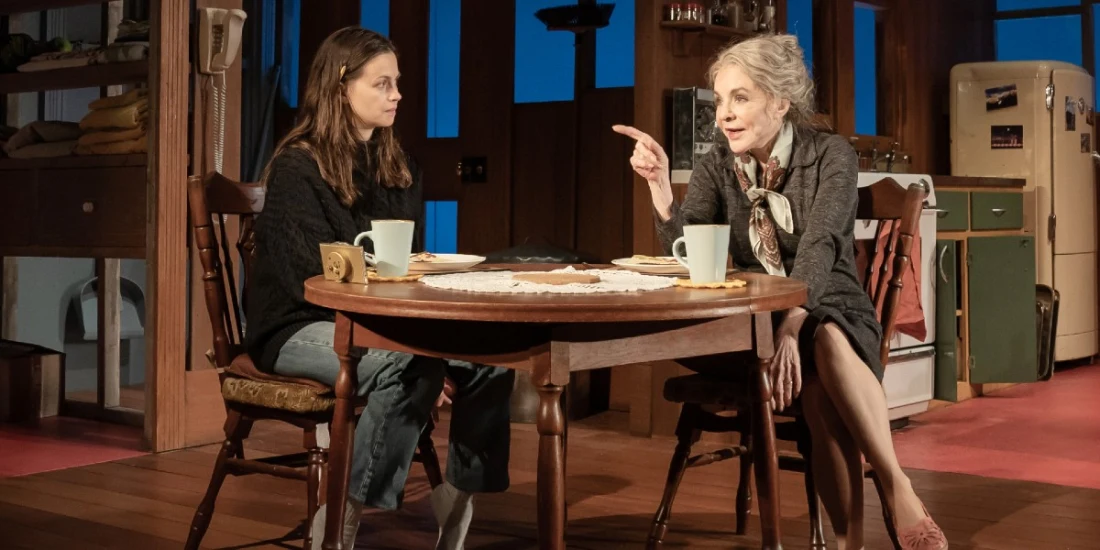'‘night, Mother' review - Stockard Channing brings empathy to a challenging play
An agelessly watchable Stockard Channing is reason enough to see 'night, Mother, the challenging Marsha Norman play that I first saw on the Harvard campus in 1982 in a production that went on to Broadway and a Pulitzer Prize and that looks less likely with time ever to be equaled. Part of that has to do with the shifting landscape surrounding a play that, were it written now, would raise as many questions as it answers: Why isn't the emotionally bereft Jessie Cates, the daughter in Norman's two-hander, taken into care or at least into some sort of custody the minute she announces to her mother Thelma that, later that evening, she is planning to shoot herself? (Not to mention that were this happening in 2021, Thelma would surely let social media be her friend.)
Nearly 40 years on, one has to take Norman's premise for what it is and to accept the play as a period piece that asks not for literal acceptance of its conceit but for a broader engagement with a play that insists upon Jessie's right to die. That such a gesture is unaccountably cruel to set out before one's own mother never really comes up in a cunning back-and-forth that lets the two women busy themselves with any number of menial tasks, all the while forestalling the grimly inevitable finale. An existential thriller, 'night, Mother leaves you in little doubt as to the play's grievous outcome, instead demanding that we peer into the psychic abyss just as Thelma tries her best to do with a daughter whom, we discover, lies irrevocably out of reach.
The very first production, staged by Tom Moore (who went on to direct an unsuccessful film of the same play), featured a then-unknown Kathy Bates as Jessie, in a career-making turn that increasingly looks like a definitive occupancy of this role; the U.K. premiere took place at the old Hampstead address, with Susan Wooldridge and Marjorie Yates. Jessie here falls to the young English actress Rebecca Night, dressed in the requisite baggy clothes, hair down, and brightly, decisively spoken as she sets out her course of action before an initially disbelieving mother (Channing). The thing is, Night's approach may be a tad too front-footed for an indrawn epileptic whose retreat from the world has summoned her towards the imagined enchantment of the further retreat allowed by death. One is aware of darker shadows cast by the character than Night's comparative matter-of-factness allows, and I, for one, kept wondering what it would be like to have Bates return to the play, this time as her previous character's mum.
The senior part is taken by Channing, a semi-regular visitor to the London stage who, now 77, is a decade or more older than a role to which she might seem an odd match: More than most American actresses of her generation, Channing has staked a brilliant claim for herself over time as a peerless stage sophisticate, playing Park Avenue housewives and women of means with effortless grace alongside an ability to summon the shifting emotions that course beneath these women's sleek facades.
So if Thelma in some ways feels like an unusual ask for a onetime queen in The Lion in Winter, Channing brings to the role a matchless empathy that evolves as Thelma is seen reeling in response to the actions of her daughter. At first dismissing Jessie's pronouncement as a sick joke, Thelma then has no choice but to participate as her daughter lays out the protocol that is to be followed once the deed is done. An inevitable truthtelling ensues as to who loved whom (or not), and we hear plenty about the missing men in the women's lives — Jessie's junkie son included — that have driven the daughter to this place, alongside the implication that some decisions lie beyond the realm of reason. They simply are what they are, 'night, Mother makes plain, and Channing follows the play's ricocheting emotional trajectory with whiplash acumen. It's to her and Night's credit, too, that neither performer for an instant patronises the sorts of rural inhabitants who these days might be getting ready to attend a Trump rally rather than anatomising their tortured souls.
Resident now in the U.K., Channing needs no introduction as American stage royalty, and I watched in continual awe at her stage smarts. From the minute Thelma refers to Jessie as "sugar" — an apposite word in a kitchen (nicely designed by Ti Green) that has seen its fair share of candy — you feel the push-me-pull-you momentum that afflicts the "accident" known as family and that has led Jessie to spend 10 years anticipating the gesture she will achieve this evening. It's tempting to think of the action of the play itself as prelude to a seismic offstage event, talk of crochet work and a manicure there to set everyday detail against the cataclysm that awaits. But, tellingly, it's Thelma who bookends the play, not Jessie, and Channing encases the production with surpassing force. In killing herself, Jessie succeeds additionally in all but killing her mother, too — the difference being that Channing's bereaved, newly childless Thelma will have to face the ghastly reality that comes with making it through to another day.
'night, Mother is running at Hampstead Theatre through 4 December.
Photo credit: Rebecca Night and Stockard Channing in 'night, Mother. (Photo by Marc Brenner)
Originally published on
